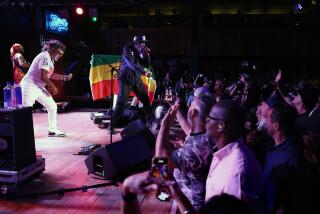Revisiting the Reggae Evolution
- Share via
Bounty Killer and Eek-A-Mouse, the headliners of Saturday’s dancehall program at the 16th annual Bob Marley Day concerts at the Long Beach Arena, offered a clear-cut distinction between reggae generations.
But that kind of division was the exception on a weekend that showed how roots reggae has moved toward the streamlined sound of ‘90s dancehall, even as dancehall’s lyrical content has moved away from sex and guns toward the “conscious” messages of Marley.
Bounty Killer has been the top deejay in Jamaica for two years, and his “My Experience” album, featuring collaborations with the Fugees and other major hip-hop artists, has been on the R&B; charts here for more than six months. By creatively stretching the musical boundaries of dancehall, Bounty Killer has made reggae’s long-sought connection with the urban hip-hop audience.
His 45-minute set was a blast of kinetic energy. Bounty Killer exploded onto the stage in a flurry of high knee kicks and roamed around before settling down into a bobbing and weaving stance. His vocals--delivered in a deep, Shabba Ranks-like voice--were equally fast and furious, and his busy six-piece backing band added new elements, including quasi-operatic vocals and keyboard lines, to the dancehall mix.
But lost in the high-energy rush was reggae’s trademark groove--the music most often worked in a rhythmic gray area that failed to include a comfortable zone for dancing. Coupled with Bounty Killer’s thick patois--and his slot at the end of the draining 10-hour show--the unrelenting pace left the undeniably charismatic deejay’s show uncompromising but largely inaccessible to the uninitiated in the audience.
While Bounty Killer is the figurehead for the new urban reggae generation, the veteran Eek-A-Mouse represented the time when reggae attracted a rock audience. His seven-piece band included three guitarists, and the lanky deejay glided around the stage during a half-hour set that relied far too much on his comic persona and tired variations on his trademark “bong diddily bong bon ding ding” vocalise.
One indication of how fluid reggae styles have become: Singers Gregory Isaacs and Luciano were scheduled to headline both Friday’s “lovers rock” show and Sunday’s closing “roots” program. Isaacs was known as the “Cool Ruler” in late ‘70s Jamaica, but bouts with substance abuse and a flood of second-rate recordings have dimmed much of the luster of his early reputation.
His 40-minute headlining set Friday wasn’t a fully triumphant comeback. After an impressive opening salvo of “Number One” and “Stranger in Your Town,” the set tailed off as it grew evident how ravaged Isaacs’ voice has become.
The much-touted Luciano opened his segment Friday by kneeling in prayer--setting the tone for a largely convincing set praising the Rastafarian deity Jah (especially with the opening “Never Give Up My Pride” and the dub-heavy “He Is My Friend”). Luciano’s singing was impressive but his decision to give stage time to singer Mikey General and deejay Sizzla cut off his performance in mid-set.
The best performance was turned in by veteran singer Barrington Levy, who wasted no time in rousing the crowd with the Jamaican hits “Murderer,” “Under Me Sensi” and “Living Dangerously.” Levy stuck to a traditional stage presentation but the combination of strong material, his trademark “woy-yoy” yodel and a ready and willing audience made even normally tiresome crowd participation routines come alive.
* The Bob Marley Day Celebration moves today to the San Diego Sports Arena, 3500 Sports Arena Blvd., San Diego, 1 p.m. $16.50-$28.50. (619) 224-4176.
More to Read
The biggest entertainment stories
Get our big stories about Hollywood, film, television, music, arts, culture and more right in your inbox as soon as they publish.
You may occasionally receive promotional content from the Los Angeles Times.










